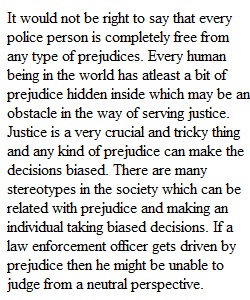


Q Police officers and other criminal justice professionals are afforded a significant amount of discretion when performing their duties. For example, many officers have the ability to independently determine whether they should pursue or ignore minor violations. Unfortunately, this comes at a price. When individuals have discretion, prejudices and negative perceptions of groups or individuals can influence their decision making. 1) Discuss the extent to which personal prejudices could negatively influence criminal justice professionals' decision making processes. 2) Is it ever right for a law enforcement officer to allow his or her decision to be based (in whole or in part) upon his or her personal prejudices or negative perceptions of groups or individuals? 3) What steps could criminal justice leaders take to limit the extent to which discretion can be utilized inappropriately?
View Related Questions